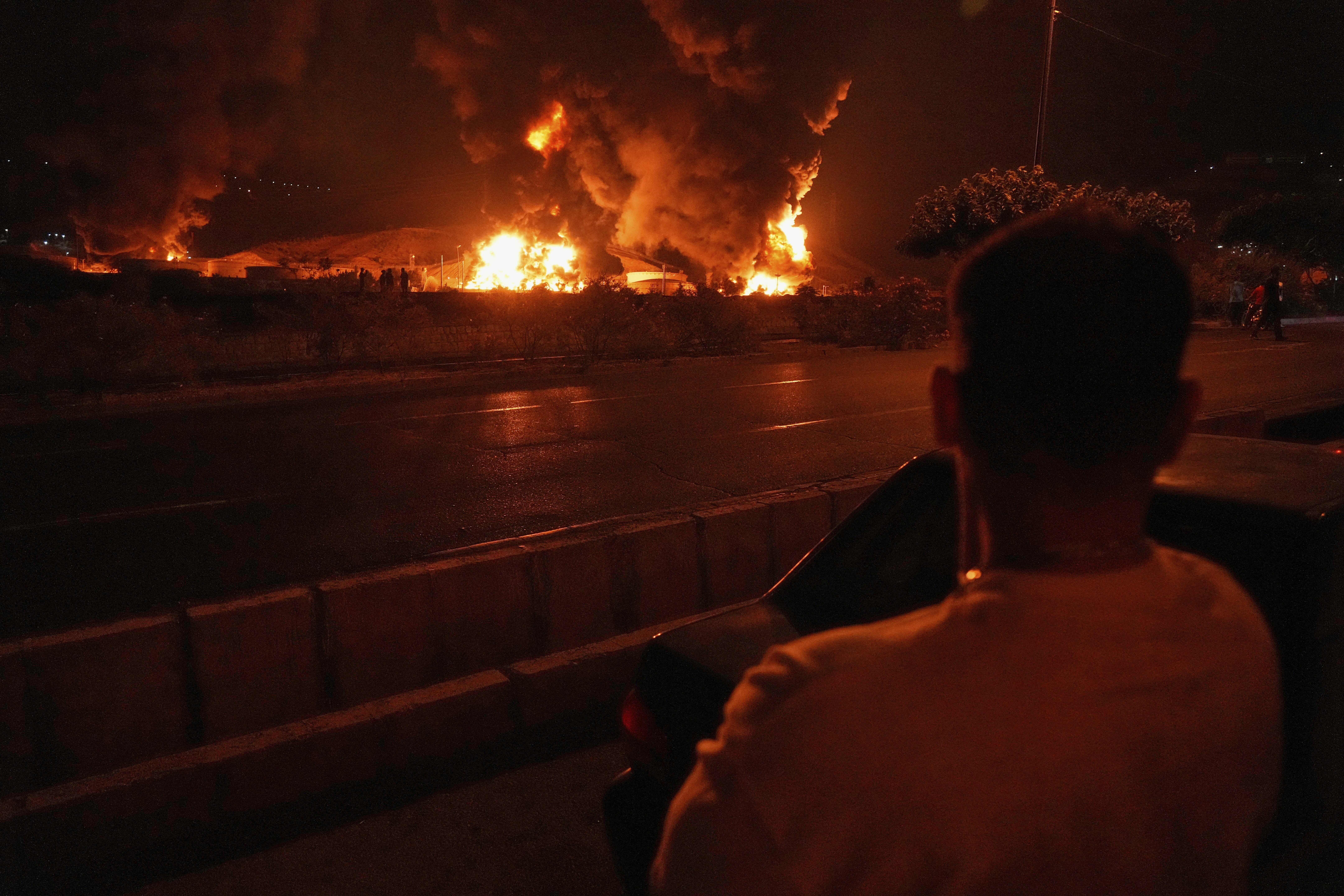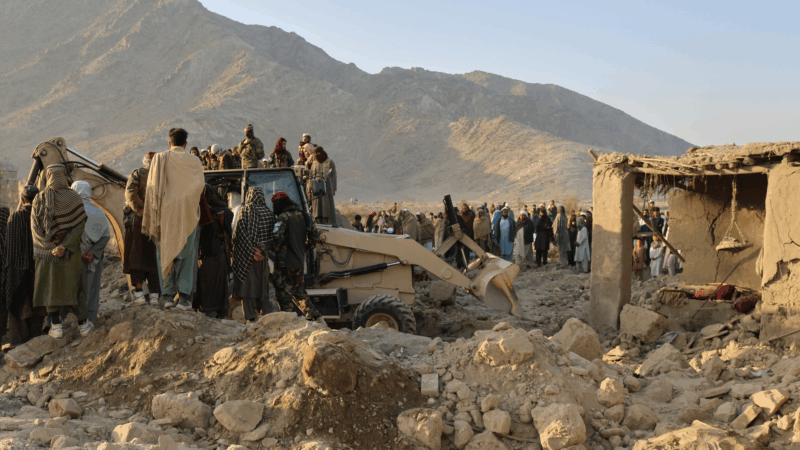Israel and Iran trade more deadly strikes in third day of escalating conflict
Israel and Iran exchanged another round of intense missile strikes into Sunday, fueling growing concerns that the fighting could escalate into a wider regional conflict. The latest exchanges came just hours after planned U.S. talks on Iran’s nuclear program were called off.
Israeli missiles struck two energy facilities in southern Iran, according to Iranian state media. In response, Iran fired hundreds of ballistic missiles and drones into Israel, causing multiple casualties and causing significant damage to an oil refinery and prominent science institute.
On social media, President Trump said the U.S. had “nothing to do with the attack on Iran, tonight,” but warned that if the U.S. was attacked by Iran in any way, that “the full strength of U.S. Armed forces will come down on [Iran] at levels never seen before.”
Hard night for Israelis
It marked the hardest night for Israelis since the start of the fighting, with at least ten casualties — including children — and hundreds injured, according to Israeli emergency services organization, Magen David Adom.
Hundreds of Iranian missiles rained down across Israel beginning Saturday night, some of them evading the country’s sophisticated defense systems.
The deadliest strikes hit a residential building in Bat Yam, a suburb south of Tel Aviv, killing at least six people including a 10-year-old boy and 9-year-old girl. Another 180 people were wounded and seven still missing, according to local police.
In the north, sirens blared and people ran for shelter as missiles struck the country’s largest oil refinery, located near the port city of Haifa. Four women were killed in Tamra, an Arab town of around 35,000 people, according to the Associated Press. Iran’s Revolutionary Guard Corps, or IRGC, said it had targeted Israel’s fuel structure in response to Israel’s strikes on its oil facilities in the south.

In the central city of Rehovot, at least 42 people were injured and several campus buildings at The Weizmann Institute of Science, a prominent research center, were also struck. The center said no one on campus was hurt, despite the extensive damage.
Sunday’s casualties bring Israel’s death toll to 13 since the start of the strikes on Friday.
Yemen’s Houthi rebels said Sunday that they had assisted Iran by launching more ballistic missiles at Israel. Israel’s military confirmed that the group also launched missiles at Israel on Friday, coinciding with Iran’s direct retaliation for Israeli strikes.
More explosions rock Tehran
Reports of explosions were heard across Tehran early Sunday, with images showing plumes of smoke and flames rising from an oil facility in the city.
“Tehran is burning,” Israel’s Defense Minister Israel Katz tweeted late Saturday.
An Israeli military official confirmed that the Israel’s Defense Forces, or IDF, attacked 80 targets overnight, including Iran’s nuclear headquarters and two fuel sites.
The death toll in Iran from the latest explosions wasn’t immediately clear. On Saturday, Iran’s UN ambassador said 78 people had been killed and more than 320 wounded since the start of Israel’s attack.
Calls for de-escalation mount
The mounting conflict comes amid rising calls for diplomacy over fighting from leads around the world.
In the same post on Truth Social where he warned Iran not to attack the U.S., President Trump urged both countries to quickly make a deal.
“We can easily get a deal done between Iran and Israel, and end this bloody conflict!!!” Trump wrote early Sunday.

Immediately following Israel’s initial attack on Iran, British Prime Minister Keir Starmer urged for restraint.
“Stability in the Middle East must be the priority,” he said. “Now is the time for restraint, calm and a return to diplomacy.”
UN Secretary General Antonio Guterres called on both sides to “show maximum restraint” and Pope Leo XIV called for “sincere dialogue” after stating the situation between Israel and Iran had “deteriorated drastically.”
Israel’s initial attack late Thursday followed intelligence from its Mossad spy agency, which Israel says suggested Iran was close to developing a nuclear weapon. Israel — widely thought to possess its own nuclear weapons — considers Iran’s nuclear program a direct threat to its national security.
The strikes came a day after the U.N. nuclear watchdog declared that Iran wasn’t complying with nuclear nonproliferation agreements aimed at halting the spread of nuclear weapons. Iran reacted saying it would create a new uranium enrichment facility. Iran says its uranium enrichment program is for peaceful purposes.

In a video statement on Friday evening, Prime Minister Netanyahu said the attack on Iran was in the works for months since September, following Israel’s assassination of Hassan Nasrallah, leader of the Lebanese militant group Hezbollah, in Beirut.
Netanyahu warned that once the region’s “Iranian axis” was broken, Iran would accelerate its nuclear program. The attack on Iran was supposed to occur in April but it was postponed, Netanyahu added.
The hostilities come as the U.S. and Iran were planning to begin the sixth round of talks about Iran’s nuclear program on Sunday in Oman.
The U.S. was trying to strike a deal with Iran to limit its uranium enrichment in exchange for lifting sanctions, which have crippled Iran’s economy.
On Saturday, the Omani foreign minister said on social media that the meeting was canceled. But he said “diplomacy and dialogue remain the only pathway to lasting peace.”
NPR’s Jane Arraf contributed reporting from Amman, Jordan.
Pakistan claims to have killed at least 70 militants in strikes along Afghan border
Pakistan's military killed at least 70 militants in strikes along the border with Afghanistan early Sunday, the deputy interior minister said.
Team USA faces tough Canadian squad in Olympic gold medal hockey game
In the first Olympics with stars of the NHL competing in over a decade, a talent-packed Team USA faces a tough test against Canada.
PHOTOS: Your car has a lot to say about who you are
Photographer Martin Roemer visited 22 countries — from the U.S. to Senegal to India — to show how our identities are connected to our mode of transportation.
Sunday Puzzle: TransformeR
NPR's Ayesha Rascoe plays the puzzle with listener Joan Suits and Weekend Edition Puzzlemaster Will Shortz.
Looking for life purpose? Start with building social ties
Research shows that having a sense of purpose can lower stress levels and boost our mental health. Finding meaning may not have to be an ambitious project.
Danish military evacuates US submariner who needed urgent medical care off Greenland
Denmark's military says its arctic command forces evacuated a crew member of a U.S. submarine off the coast of Greenland for urgent medical treatment.






